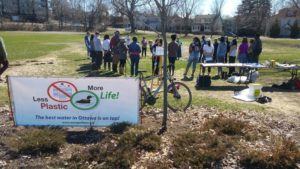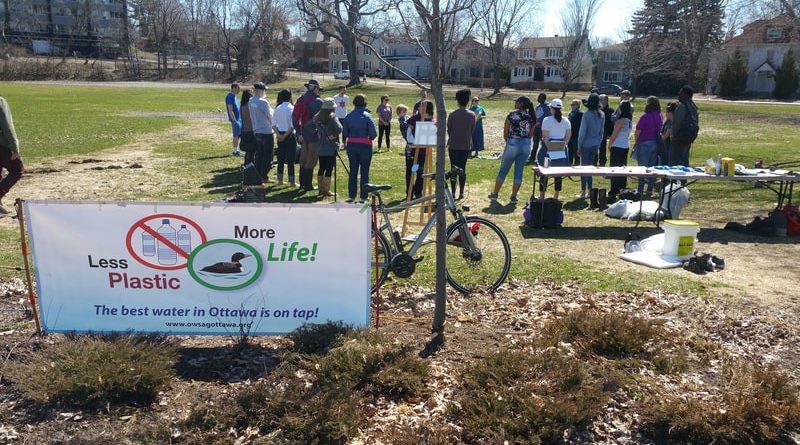The best water in town is on tap
Eric Schiller & Diane Holmes

The environmental movement is gathering steam in Sandy Hill. On Earth Day, April 22, at Adàwe Crossing, OWSAG and Ottawa Riverkeepers collected waste products along the Rideau River. All used plastic water bottles collected will be saved for an event later in the summer which will highlight the fact that these bottles are not needed because Ottawa has excellent tap water.
Water from the tap instead of in plastic bottles is fine. So why not use tap water instead? We don’t do it because bottled water makes immense amounts of money for some very large international corporations which have enormous budgets, and cities have always been financially fragile.
Here are the ABCs of bottled water.
A—City water is safer: Municipal tap water is tested more frequently for more elements than bottled water.
B—City water is healthier: Ottawa’s water includes calcium and magnesium that are naturally occurring. Bottled water has been demineralised, making the water less healthy.
C—City water is less expensive: A plastic bottle of water can cost up to 1500 times the cost of a glass of tap water.
D—Recycling in Ottawa is not working: Far less than 50% of plastic water bottles are recycled. Ottawa has one of the lowest records for recycling in the province. There is little money to promote recycling in the City budget.
E—The City does not promote its own tap water: The City budget for water is $95 million per year. Of that, $10,000 is spent on promotion materials for city water. If you add in staff time, the amount goes up to $100,000. So the reality is that there is so little promotion of City tap water that it doesn’t register in the minds of the people who pay for it—you.
F—Selling out to Coca-Cola: In 2010 the Department of Recreation was told to find private sector dollars. The suggestion was that they could procure naming rights and pouring rights. Not surprisingly, there were no companies interested in naming swimming pools, baseball diamonds and gyms. But Coca-Cola was happy, (over the Public Health Department’s objections), to secure the contracts for pouring rights in City community centres. We now have Coke and Pepsi dispensing machines conveniently located at City Hall and in our community centres.
In the two years left in the contract for Coke and Pepsi, 360,000 more plastic bottles will be sold. Where will they end up? In our landfills, streams, rivers, and some will float to the ocean. We can easily live without Coke and Pepsi vending machines in our City facilities. We need single-use plastic bottles removed from city buildings. This would reduce the use of bottled water so that we would have less plastic in our garbage trucks and in our environment.
